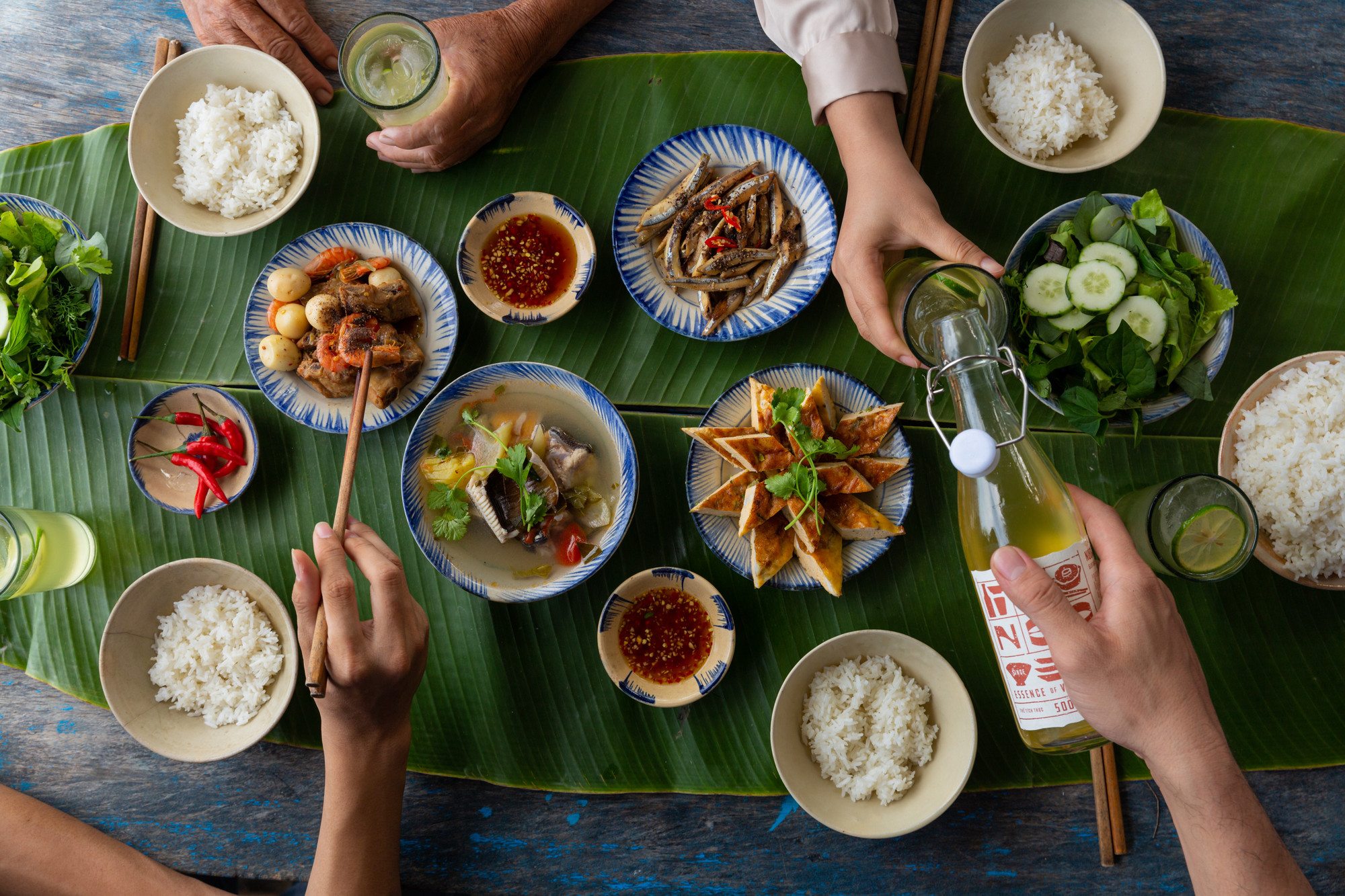Từ những mẻ gạo nếp lên men năm xưa của bà ngoại, chị Ngô Thảo Vương (SN 1995, Giám đốc sáng tạo Công ty CP Nếp Việt Heritage, 194 Lý Thái Tổ, phường Quy Nhơn Nam) đã khởi nghiệp với mong muốn đưa hương vị quen thuộc trở lại bàn ăn Việt bằng một cách kể mới.
Trong gia đình chị, nước nếp lên men từng là món uống bồi bổ sau sinh, được làm thủ công từ hạt nếp quê nhà. Năm 2021, chị Vương và cộng sự phát triển sản phẩm NEP SINCE 1995 - dòng đồ uống khai vị lên men từ gạo nếp, hướng đến sức khỏe tiêu hóa, phù hợp với mọi lứa tuổi.
Mỗi mẻ nếp đều được xử lý, lên men bằng phương pháp truyền thống để giữ vị nguyên bản. Nhưng những người trẻ trong đội ngũ NEP đã ứng dụng khoa học để kiểm soát quá trình lên men, nhiệt độ, độ ẩm, đảm bảo an toàn và ổn định chất lượng.

Với chị Vương, NEP không chỉ là sản phẩm đơn thuần mà còn là cách kể chuyện văn hóa: Từng chi tiết thiết kế, bao bì, cách trưng bày đều được gắn với tinh thần văn hóa địa phương.
Theo đó, nhãn hàng đã hợp tác với nghệ nhân làng nón ngựa Phú Gia và gốm Vân Sơn để tạo nên các sản phẩm trưng bày, hay tạo nên chiếc khay gỗ lấy cảm hứng từ nghệ thuật Tuồng.
Với mong muốn khai thác tối đa giá trị của cây sen, anh Nguyễn Văn Xong (SN 1992, chủ thương hiệu Năm Xong, phường Hoài Nhơn) đã xây dựng mô hình phát triển sản phẩm sen theo hướng xanh và bền vững.
Khởi đầu năm 2018 với diện tích chỉ 1 ha và 3 lao động, đến nay Năm Xong đã mở rộng 50 ha vùng nguyên liệu, kết nối thêm vùng trồng sen ở xã Phù Mỹ Nam. Cơ sở có xưởng chế biến 300 m², được đầu tư hệ thống máy nghiền, sấy lạnh, hút chân không để đảm bảo chất lượng cho các sản phẩm, như: Trà hạt sen rang, bột hạt sen, trà lá sen, trà tâm sen, hạt sen sấy và trà shan tuyết ướp hoa sen.
Mỗi năm, Năm Xong tạo việc làm ổn định cho 9 lao động cố định và hơn 40 lao động thời vụ, cung cấp hàng trăm nghìn sản phẩm ra thị trường. Nỗ lực ấy giúp anh Xong và cộng sự đoạt giải nhất Cuộc thi Dự án khởi nghiệp sáng tạo thanh niên cấp tỉnh năm 2023, có 2 sản phẩm OCOP 3 sao vào năm 2024; đoạt giải Khuyến khích Dự án khởi nghiệp thanh niên nông thôn 2025 do Trung ương Đoàn tổ chức.
Không chỉ dừng ở sản xuất, từ năm 2022, anh Xong mở loại hình du lịch trải nghiệm trên chính đầm sen quê mình. Anh dựng một căn chòi nhỏ được dựng giữa hồ để du khách vừa thưởng trà sen, vừa ngắm sen nở; hoặc đi tour tham quan trang trại rau sạch và các làng nghề truyền thống liên quan đến dừa.
Mỗi mùa sen nở (từ tháng 3 đến tháng 7), nơi đây đón khoảng 2.000 lượt khách, mang đến không khí vừa yên bình vừa sinh động, giúp người dân địa phương tăng thêm thu nhập. Hướng tới giai đoạn 2025-2028, anh Xong cùng cộng sự đang hoàn thiện các tiêu chuẩn FDA, HACCP, HALAL để xuất khẩu, đồng thời chuẩn bị đăng ký thêm 3 sản phẩm OCOP cấp tỉnh mới vào năm 2026.
Từ nghề làm bánh ít lá gai truyền thống của mẹ, chị Hồ Thị Mỹ Phúc (SN 1990, chủ cơ sở Hoàng Đông, xã Bình An) đã tìm hướng phát triển bền vững cho món bánh quê.
Những năm đầu, mọi công đoạn đều thủ công, vất vả mà năng suất thấp, bánh khó bảo quản lâu nên chỉ tiêu thụ quanh vùng. Nhận thấy nếu không đổi mới thì nghề sẽ khó tồn tại, năm 2023, chị đầu tư máy móc hiện đại hỗ trợ khâu sản xuất, giúp nâng năng suất, rút ngắn thời gian và kéo dài thời gian bảo quản bánh từ 3-4 ngày lên 7-10 ngày. Mỗi gói bánh được hút chân không, giữ trọn độ dẻo và hương vị đặc trưng.
“Đổi mới không có nghĩa là bỏ nghề cũ. Máy móc chỉ giúp giảm công đoạn nặng nhọc, còn phần tinh tế như nặn nhân, gói lá vẫn phải do người thợ làm bằng tay. Nhờ vậy, bánh vừa có độ chuẩn xác, vừa giữ được hồn nghề”-chị Phúc kể.
Không chỉ đầu tư sản xuất, chị còn học cách quảng bá sản phẩm trên nền tảng số. Mỗi tuần, chị tổ chức các buổi livestream bán hàng trên TikTok và Facebook, thu hút hàng chục nghìn lượt xem. Mỗi buổi phát sóng có thể tiêu thụ từ 5.000-10.000 chiếc bánh. Bên cạnh đó, chị thường chia sẻ video ngắn giới thiệu quy trình từ chọn lá gai, vo nếp đến hấp bánh, để người xem hiểu và trân quý công sức của người thợ.
Nguồn: https://baogialai.com.vn/nguoi-tre-lam-moi-hon-que-post569905.html


















































































































Comment (0)